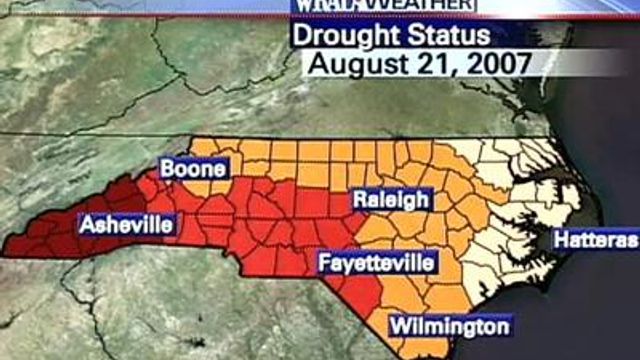Weather
Governor Urges N.C. to Cut Water Use as Drought Worsens
As drought conditions worsen, Gov. Mike Easley has asked all residents to cut back their water consumption 20 percent.
Posted — UpdatedRALEIGH, N.C. — As North Carolina's drought situation worsens, Gov. Mike Easley on Thursday urged all residents to cut back their water consumption 20 percent.
"Stream flows and groundwater levels are approaching their lowest levels in recorded history, and many of our reservoirs are declining by 1 foot every 10 days," Easley said in a news release. "We all must conserve if we are to, in any way, minimize the impact of the drought."
Easley also directed state agencies in all 100 counties to stop nonessential water use after the state Drought Management Advisory Council's latest report shows the entire state is experiencing some form of drought – from moderate conditions along the coast to what the Drought Monitor classifies as exceptional conditions in the far west parts of the state.
Most of Central North Carolina, including Wake, Durham, Orange and Johnston counties, is under a severe drought, according to the report, which reflects drought conditions as of Tuesday.
Chatham, Hoke, Harnett, Lee and Moore counties are in an area experiencing extreme drought conditions.
Last week, much of the state was experiencing less severe drought conditions with the exception of six coastal counties, which were only listed in an abnormally dry status.
State officials say the state needs at least 15 inches of rain in the next few months to ease the drought conditions. But weather officials say there is no sign of significant rainfall.
Effects can already be seen across the state.
As of Thursday, 59 of the state's 597 public water systems have imposed voluntary water restrictions and 21 have imposed mandatory water restrictions, the governor's office said.
The City of Raleigh, for example, decided to implement Stage 1 water restrictions starting Tuesday, which will further limit when city customers can water their lawns.
Easley said Wednesday he will ask the U.S. Department of Agriculture for federal assistance for farmers whose crops and livestock are suffering.
Swimming beaches at Lake Norman and Lake James in the western part of the state will close beginning Friday because water levels are so far below normal, state officials said.
Copyright 2024 by Capitol Broadcasting Company. All rights reserved. This material may not be published, broadcast, rewritten or redistributed.






